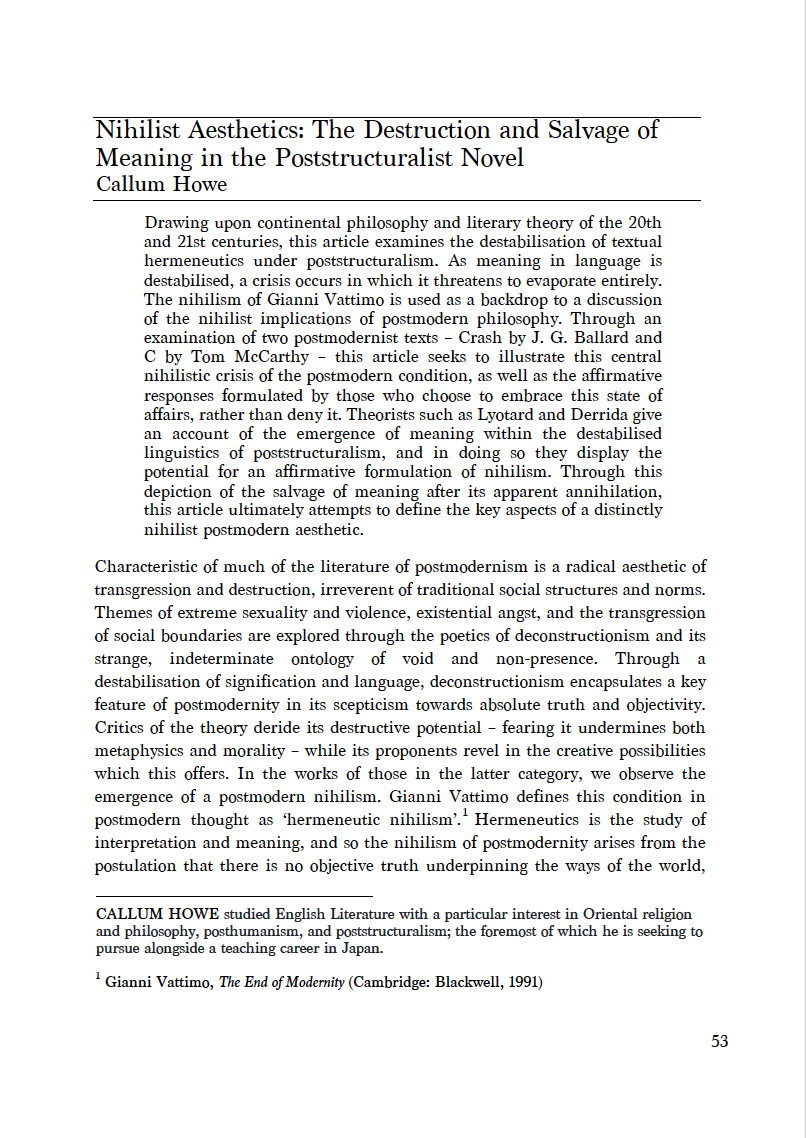Nihilist Aesthetics
The Destruction and Salvage of Meaning in the Poststructuralist Novel
DOI:
https://doi.org/10.36399/GroundingsUG.10.187Keywords:
Postmodernism, J. G. Ballard, Crash, Tom McCarthy, C, Nihilism, Poststructuralism, Vattimo, MeaningAbstract
Drawing upon continental philosophy and literary theory of the 20th and 21st centuries, this article examines the destabilisation of textual hermeneutics under poststructuralism. As meaning in language is destabilised, a crisis occurs in which it threatens to evaporate entirely. The nihilism of Gianni Vattimo is used as a backdrop to a discussion of the nihilist implications of postmodern philosophy. Through an examination of two postmodernist texts – Crash by J. G. Ballard and C by Tom McCarthy – this article seeks to illustrate this central nihilistic crisis of the postmodern condition, as well as the affirmative responses formulated by those who choose to embrace this state of affairs, rather than deny it. Theorists such as Lyotard and Derrida give an account of the emergence of meaning within the destabilised linguistics of poststructuralism, and in doing so they display the potential for an affirmative formulation of nihilism. Through this depiction of the salvage of meaning after its apparent annihilation, this article ultimately attempts to define the key aspects of a distinctly nihilist postmodern aesthetic.
References
Abrams, M. H., ‘The Deconstructive Angel’, Critical Inquiry (1977) 3, pp. 425-438.
Annesley, James, Blank Fictions (London: Pluto Press, 1998).
Aylesworth, Gary, ‘Postmodernism’, in The Stanford Encyclopedia of Philosophy (March 21st 2015), http://plato.stanford.edu/archives/spr2015/entries/postmodernism/ [accessed 24.03.16].
Ballard, J. G., Crash (1973; London: Fourth Estate, 2014) p.29.
Barthes, Roland, ‘The Death of the Author’ in The Norton Anthology of Theory and Criticism, ed. by Vincent B. Leitch, 2nd edn. (London: Norton, 2010).
Baudrillard, Jean, ‘The Precession of Simulacra’ in The Norton Anthology of Theory and Criticism, ed. by Vincent B. Leitch, 2nd end. (London: Norton, 2010).
Derrida, Jacques, ‘Structure Sign and Play’, in Writing and Difference, trans. Alan Bass (1978; London: Routledge, 2001) pp.351-370.
Heiler, Lars, ‘The Holocaust and Aesthetic Transgression in Contemporary British Fiction’ in Taboo and Transgression in British Literature from the Renaissance to the Present, ed. by Stefan Horlacher, Stefan Glomb, Lars Heiler (New York: Palgrave MacMillan, 2010).
Lacan, Jacques, The Psychoses: The Seminars of Jacques Lacan, trans. Russell Grigg, ed. by Jacques-Alain Miller (1981; New York: Norton, 1993).
Lacan, Jacques, ‘The Agency of the Letter in the Unconscious’ in The Norton Anthology of Theory and Criticism, ed. by Vincent B. Leitch, 2nd end. (London: Norton, 2010).
Lyotard, Jean-Francois, The Postmodern Condition, trans. Geoff Bennington, Brian Massumi (1979; Minneapolis: University of Minnesota Press, 1984).
McCarthy, Tom, C (London: Vintage, 2010).
de Saussure, Ferdinand, ‘Course in General Linguistics’ in The Norton Anthology of Theory and Criticism, ed. by Vincent B. Leitch, 2nd end. (London: Norton, 2010).
Slocombe, Will, Nihilism and the Postmodern Sublime (London: Routledge, 2006).
Sorensen, Roy, ‘Nothingness’, in The Stanford Encyclopedia of Philosophy (June 21st 2015), http://plato.stanford.edu/archives/sum2015/entries/nothingness/ [accessed 24.03.16].
Vattimo, Gianni, The End of Modernity (Cambridge: Blackwell, 1991).

Downloads
Published
Issue
Section
License
Copyright (c) 2017 Callum Howe

This work is licensed under a Creative Commons Attribution 4.0 International License.
The CC BY 4.0 license is a Creative Commons license. This is a non-copyleft free license that is good for art and entertainment works, and educational works. It is compatible with all versions of the GNU GPL; however, like all CC licenses, it should not be used on software. People are free to: Share — copy and redistribute the material in any medium or format; Adapt — remix, transform, and build upon the material for any purpose, even commercially. The licensor cannot revoke these freedoms as long as you follow the license terms. But they must conform to the following terms: Attribution — You must give appropriate credit, provide a link to the license, and indicate if changes were made. You may do so in any reasonable manner, but not in any way that suggests the licensor endorses you or your use. No additional restrictions — You may not apply legal terms or technological measures that legally restrict others from doing anything the license permits.
Please check individual article PDF copies to see if any additional restrictions apply.







